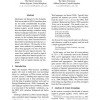364 search results - page 25 / 73 » Description Logics for Relative Terminologies |
ER
2004
Springer
14 years 1 months ago
2004
Springer
The envisioned Semantic Web aims to provide richly annotated and explicitly structured Web pages in XML, RDF, or description logics, based upon underlying ontologies and thesauri. ...
IEAAIE
1998
Springer
14 years 8 days ago
1998
Springer
The users of libraries of object-oriented software components face with both a terminological and a cognitive gap. Usually, library users do not understand the vocabulary used in t...
AAAI
2007
13 years 10 months ago
2007
Forgetting irrelevant/problematic actions in a domain description can be useful in solving reasoning problems, such as query answering, planning, conflict resolution, prediction,...
INLG
2010
Springer
13 years 6 months ago
2010
Springer
Ontologies and datasets for the Semantic Web are encoded in OWL formalisms that are not easily comprehended by people. To make ontologies accessible to human domain experts, sever...
SYNTHESE
2008
13 years 8 months ago
2008
Dynamic Epistemic Logic (DEL) is the study of how to reason about knowledge, belief, and communication. This paper studies the relative expressivity of certain fragments of the DE...

